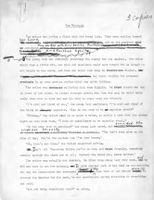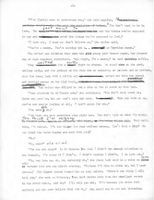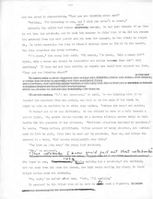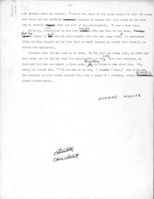The Mailer Review/Volume 12, 2018/The Notebook
| « | The Mailer Review • Volume 12 Number 1 • 2018 | » |
Norman Mailer
Note: “The Notebook,” a short story by Norman Mailer, was never published. It is not known with certainty when Mailer wrote the story, but its date of composition is believed to be circa 1953. The Norman Mailer estate has graciously given permission to reprint the story. Typescript images with holograph revisions are courtesy of the Harry Ransom Center, University of Texas at Austin.
URL: https://prmlr.us/mr12mail
The writer was having a fight with his young lady. They were walking toward her home, and as the argument continued, they walked with their bodies further and further apart.
The young lady was obviously providing the energy for the quarrel. Her voice would rise a little bit, her head and shoulders would move toward him as though to add weight to her words, and then she would turn away in disgust, her heels tapping the pavement in an even precise rhythm which was quite furious.
The writer was suffering with some dignity. He placed one leg in front of the other, he looked straight ahead, his face was sad, he would smile sadly from time to time and nod his head to every word she uttered.
“I’m sick and tired of you,” the young lady exclaimed, “I’m sick and tired of you being so superior. What do you have to be superior about?”
“Nothing,” the writer said in so quiet a voice, so gentle a tone that his answer might as well have been, “I have my saintliness to be superior about.”
“Do you ever give me anything?” the young lady asked, and provided the response herself. “You don’t even give me the time of day. You’re the coldest man I’ve ever known.”
“Oh, that’s not true,” the writer suggested softly.
“Isn’t it? Everybody thinks you’re so nice and friendly, everybody except anybody who knows you at all. Anybody who knows you, knows better.”
The writer was actually not unmoved. He liked this young lady very much, and he did not want to see her unhappy. If with another part of his mind he was noticing the way she constructed her sentences, the last word of one phrase seeming to provide the impetus for the next, he was nonetheless paying attention to everything she said.
“Are you being completely fair?” he asked.
“I’ve finally come to understand you,” she said angrily. “You don’t want to be in love. You just want to say the things you’re supposed to say and watch the things you’re supposed to feel.”
“I love you. I know you don’t believe me,” the writer said.
“You’re a mummy. You’re nothing but a . . . an Egyptian mummy.”
The writer was thinking that when the young lady became angry, her imagery was at best somewhat uninspired. “All right, I’m a mummy,” he said softly.
They waited for a traffic light to change. He stood at the curb, smiling sadly, and the sadness on his face was so complete, so patient and so perfect, that the young lady with a little cry darted out into the street and trotted across on her high heels. The writer was obliged to run a step or two to catch up with her.
“Your attitude is different now,” she continued. “You don’t care about me. Maybe you used to, but you don’t care anymore. When you look at me, you’re not really looking at all. I don’t exist for you.”
“You know you do.”
“You wish you were somewhere else right now. You don’t like me when I’m nasty. You think I’m vulgar. Very well, then, I’m vulgar. I’m too vulgar for your refined senses. Isn’t that a pity? Do you think the world begins and ends with you?”
“No.”
“No, what?” she cried.
“Why are you angry? Is it because you feel I didn’t pay enough attention to you tonight. I’m sorry if I didn’t. I didn’t realize I didn’t. I do love you.”
“Oh, you love me, oh, you certainly do,” the young lady said in a voice so heavy with sarcasm that she was almost weeping. “Perhaps I’d like to think so, but I know better.” Her figure leaned toward his as they walked. “There’s one thing I will tell you,” she went on bitterly, “you hurt people more than the cruelest person in the world could. And why? I’ll tell you why. It’s because you never feel anything and you make believe that you do.” She could see he was not listening, and she asked in exasperation, “What are you thinking about now?”
“Nothing. I’m listening to you, and I wish you weren’t so upset.” Actually the writer had become quite uneasy. He had just thought of an idea to put into his notebook, and it made him anxious to think that if he did not remove his notebook from his vest pocket and jot down the thought, he was likely to forget it. He tried repeating the idea to himself several times to fix it in his memory, but this procedure was never certain.
“I’m upset,” the young lady said. “Of course, I’m upset. Only a mummy isn’t upset, only a mummy can always be reasonable and polite because they don’t feel anything.” If they had not been walking so quickly she would have stamped her foot. “What are you thinking about?”
“It’s not important,” he said. He was thinking that if he removed the notebook from his pocket, and held it in the palm of his hand, he might be able to scribble in it while they walked. Perhaps she would not notice.
It turned out to be too difficult. He was obliged to come to a halt beneath a street light. His pencil worked rapidly in a nervous elliptic script while he felt beside him the pressure of her presence. “Emotional situation deepened by notebook,” he wrote. “Young writer, girlfriend. Writer accused of being observer, not participant in life by girl. Gets idea he must put in notebook. Does so, and brings the quarrel to a head. Girl breaks relationship over this.”
“You have an idea now,” the young lady murmured.
“Hmm,” he answered.
“That notebook. I knew you’d pull out that notebook.” She began to cry. “Why you’re nothing but a notebook,” she shrieked, and ran away from him down the street, her high heels mocking her misery in their bright tattoo upon the sidewalk.
“No, wait,” he called after her. “Wait, I’ll explain.”
It occurred to the writer that if he were to do such a vignette, the nuances could be altered. Perhaps the point of the piece should be that the young man takes out his notebook because he senses that this would be the best way to destroy what was left of the relationship. It was a nice idea.
Abruptly, it also occurred to him that maybe this was what he had done. Had he wished to end his own relationship with his own young lady? He considered this, priding himself on the fact that he would conceal no motive from himself, no matter how unpleasant.
Somehow, this did not seem to be true. He did like the young lady, he liked her very much, and he did not wish the relationship to end yet. With some surprise, he realized that she was almost a block away. Therefore, he began to run after her. “No, wait,” he called out. “I’ll explain it to you, I promise I will.” And as he ran the notebook jiggled warmly against his side, a puppy of a playmate, always faithful, always affectionate.



